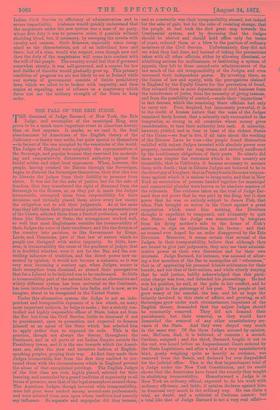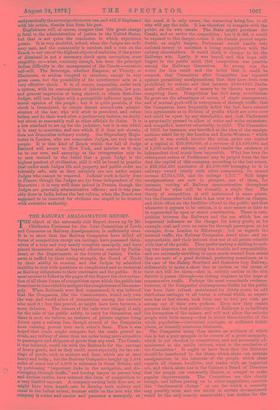THE FALL OF THE ERIE JUDGE.
THE dismissal of Judge Barnard, of New York, the Erie Judge, and accomplice of the municipal Ring, may prove to be a much more important event in American history than at first appears. It marks, as we read it, the final abandonment by Americans of the English theory of the Judiciary—a theory very noble, but quite special to themselves —in favour of the one accepted by the remainder of the world. The Judges of England were originally the representatives of the Sovereign, and popular because they exercised his moderat- ing and comparatively disinterested authority against the feudal nobles and other local oppressors. When, however, the people, having crushed the Barons through the Sovereigns, began to distrust the Sovereigns themselves, their first idea was to liberate the judges from their liability to pressure from above. It was not for the sake of justice, but for the sake of freedom, that they transferred the right of dismissal from the Sovereign to the Houses, or, as they put it, made the Judges irremovable, exempted them from responsibility for their decisions, and virtually placed them above every law except the obligation not to sell their judgments. As at the same time they left them their grand social position as representatives of the Crown, selected them from a limited profession, and paid them like Ministers of State, the arrangement worked well, so well that most Englishmen consider the irremovability of their Judges the cause of their excellence, and like the division of the country into parishes, or like Government by Kings, Lords, and Commons, part of that law of nature which no people can disregard with entire impunity. So little, how- ever, is irremovability the cause of the goodness of judges, that it is doubtful whether, were it not for the Bar, and the con- trolling influence of tradition, and the direct power now ex- ercised by opinion, it would not become a nuisance, as it was very near becoming a century ago, when Judges, secure in their exemption from dismissal, so abused their prerogatives that for a Liberal to be indicted was to be condemned. So little is irremovability part of the natural law, that an alternative and widely different system has been universal on the Continent, has been introduced by ourselves into India, and is now, as we imagine, about to be recognised in the United States.
Under this alternative system the Judge is not an inde- pendent and irresponsible exponent of a law which, on many most important subjects, he helps to make ; but a strictly con- trolled and highly responsible officer of State, taken not from the Bar, but from the Civil Service, liable to dismissal if not to punishment, open to promotion, and expected to demean himself as an agent of the State which has selected him to apply rather than to expound its code. This is the practice, though not always the theory, throughout the Continent, and in all parts of our Indian Empire outside the Presidency towns, and it is the one towards which the Ameri- cans are, after the slow and tentative fashion of English- speaking peoples, groping their way. At first they made their Judges irremovable, but from the first they omitted to sur- round them with the circumstances which in England prevent the abuse of that exceptional privilege. The English Judges of the first class are rich, highly placed, selected for their learning, and controlled by a grand tradition of superiority to all forms of pressure, save that of the legal atmosphere around them. The American Judges, though invested with irresponsibility, were left poor, were ranked among second-rate professionals, and were selected from men upon whom tradition had scarcely any influence. So separate and unpopular did they become, and so constantly was their irresponsibility abused, not indeed for the sake of gain, but for the sake of resisting change, that the people at last took the first great step towards the Continental system, and by decreeing that the Judges should be elected and should hold office only for terms of years, reduced them at a blow to the position of ordinary members of the Civil Service. Unfortunately, they did not see what they had done, and instead of taking the precautions taken with all other officials, either by allowing dismissal, or admitting actions for malfeasance, or instituting a system of appeals, they left to these second-rate administrators of the law much of the old irresponsibility of the Judges, and even increased their independent power. By investing them, on the fusion of law and equity, with the prerogatives claimed in England by the Equity Courts for the prevention of fraud, they released them in most departments of civil business from the interference of juries, from the necessity of giving reasons, and from the possibility of control,—made their "injunctions" in fact decrees, which the remaining State officials had only to carry out. Poor, despised, but immensely powerful, it is to the credit of human nature that the mass of the Judges remained fairly honest, that a minority only succumbed to the temptation, so strong in all countries where money gives consideration, to turn their authority into cash. A minority, however, yielded, and in four at least of the richest States of the Union—we fear in five, if all tales about the working of the Divorce Laws be true—the people found themselves saddled with unjust Judges invested with absolute power over property, irremovable for long terms, and entirely unaffected by the traditionary obligations of their posts. So utterly did these men despise the restraints which in this country are irresistible, that in California it became necessary to menace them with death ; that in Illinois Judges are believed to be in the direct pay of burglars; that in Pennsylvania theraare corpora- tions against which it is useless to bring suits, and that in New York an association of persons banded together for municipal and commercial plunder were known to be absolute masters of the tribunals. The evidence taken on the trial of Judge Bar- nard does not prove that he was paid by the Ring, but it does prove that he was so entirely subject to James Fisk, that when Fisk brought an action in his Court against a great corporation which owed him nothing, the Directors thought it expedient to compound, and ultimately to quit the State; that the Judge was summoned by telegram from his dying mother's side to the house of Fisk's mistress, to sign an injunction in his favour ; and that no counsel ever hoped for an order disapproved by the Erie Directors. Moreover, it seems certain that several of the Judges, in their irresponsibility, believe that although they are bound to give just judgments, they may use their adminis- trative power at their own discretion and for their own interests. Judge Barnard, for instance, was accused of allow- ing a few members of the Bar to monopolise all "references," that is, of appointing his personal friends arbitrators for their benefit, and not that of their suitors, and while utterly denying that he sold justice, boldly acknowledged that this parti- cular charge was true, and defended his proceedings. He had won his position, he said, at the polls in fair conflict, and he had a right to the patronage of his post. The people at last grew weary of the -scandal, the loss, and let us hope the iniquity involved in this state of affairs, and growing, as all Sovereigns grow under such circumstances, impatient of the English theory, demanded that the unjust Judges should be summarily removed. They did not demand their punishment, but their removal, as they would have demanded the removal of any other unsatisfactory ser- vants of the State. And they were obeyed very much in the same way. Of the three Judges accused by opinion, one, McCann, died, it is believed, of remorse ; a second, Cardoso, resigned ; and the third, Barnard, fought it out to the end, was heard before an Impeachment Court ordered by the State Legislature, and after a trial of a very unsatisfactory kind, gossip weighing quite as heavily as evidence, was removed from the Bench, and declared for ever disqualified for the judicial office. This is the first impeachment trial of a Judge under the New York Constitution, and its result shows that the Americans have found the remedy they sought in abolishing irremovability. Henceforward a Judge is in New York an ordinary official, expected to do his work with ordinary efficiency, and liable, if opinion declares against him, to dismissal very much in the ordinary way. He can claim a trial, no doubt, and a collector of Customs cannot; but a trial like that of Judge Barnard is not a very real affair-- and practically the sovereign electorate Can, and will, if displeased' the canal it is only owner, the water-way being free to all
with his action, dismiss him from his post.
Englishmen will, of course, imagine that this great change is fatal to the administration of justice in the United Btates, but that is not quite the conclusion to which experience points. It is very doubtful, indeed, when the Judges are ordi- nary men, and the community is careless, and a seat on the Bench is not one of the highest objects of ambition, if the power of dismissal is not a necessary check upon corruption, crass stupidity, or—what, curiously enough, has been the principal Indian difficulty in the management of the Courts—eccentric self-will. . The Sovereign, whether Emperor, or Viceroy, or Electorate, is seldom tempted to interfere, except in very gross cases, but the possibility of his interference acts as a very effective check. It is, of course, impossible, under such a system, with its concomitants of inferior position, low pay, and general impression of being shelved, to obtain first-class Judges, still less Judges with a perceptible influence upon the moral opinion of the people ; but it is quite possible, if the check is formulated, to obtain decent second-rate admini- strators of the law, who will stick to precedent, and refuse bribes, and do their work after a perfunctory fashion, no doubt, but about as reasonably well as other officials do theirs. It is a low standard to set up for the judiciary, but it is one which it is easy to maintain, and one which, if it does not elevate, does not demoralise ordinary society. OurBtipendiary Magis- trates in London, who are removable Judges, are very decent people. It is this kind of Bench which the fall of Judge Barnard will secure to New York, and inferior as it may be to our own, and annoying as the retrogression may be to men trained in the belief that a great Judge is the highest product of civilisation, still it will be found in practice that under such Judges life and property and public order are tolerably safe, safe as they certainly are not under unjust Judges who cannot be removed. Judicial work is fairly done in France, though the Judges are far from independent of the Executive ; it is very well done indeed in Prussia, though the Judges are generally administrative officers; and it was pass- ably done in India before the last reform, when the Bench was supposed to be reserved for civilians too stupid to be trusted with executive authority.



































 Previous page
Previous page